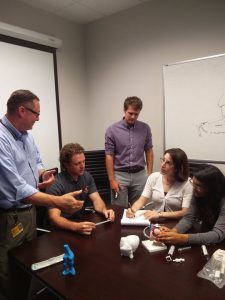You’re a researcher or engineer who has found a clinician with a strong unmet clinical need your technology might solve.
Outstanding! Too many technologies go looking for problems to solve instead of finding the clinically stated problem first and fitting your technology to meet it in a way that truly works in the clinical setting.
However, any solution, device, software, drug, biologic, gene therapy … any solution, is subject to the significant, necessary rigors applied by regulatory bodies and, ultimately, market forces. Those rigors increase in intensity based on predicate technologies or devices and the relative invasive nature of their use, adjacent to, in contact with, or invasive within the patient.
 If you have come to believe, with preliminary clinical input, that your technology has potential to improve patient care and outcomes, you will need the following at minimum before it can approach emergency use authorization or, much farther down the road, clinical trials.
If you have come to believe, with preliminary clinical input, that your technology has potential to improve patient care and outcomes, you will need the following at minimum before it can approach emergency use authorization or, much farther down the road, clinical trials.
- A robust design history file, including
- A robust Failure Mode and Effects Analysis (FMEA),
- Frequently an IRB evaluation,
- Prototypes that can ultimately translate to manufacturing,
- A manufacturer of record capable of Good Manufacturing Process, and
- Regular user input as design inputs and prototypes progress.
Note: that is an abridged list for the sake of brevity. Milestones on a medical technology’s pathway vary widely based on its nature, intended use and market or full commercialization potential.
If you are a faculty member, researcher or clinician innovator with a strong indication that your technology may effectively meet an unmet clinical need, GCMI’s phase-gated design and development process, along with our facilities, resources and expertise, is designed to effectively de-risk new medical technologies and accelerate their implementation or adoption in the clinical setting.
The important part is to get in touch with us early. We know how this process works, we know where the pitfalls are, and we know what it takes to make it happen. We’ve done it for your colleagues and peers like Scott Hollister, Woonhong Yeo, Omer Inan and others.
Contact our Director of Scientific Affairs Evan Goldberg to get the discussion started. evan.goldberg@t3labs.org
